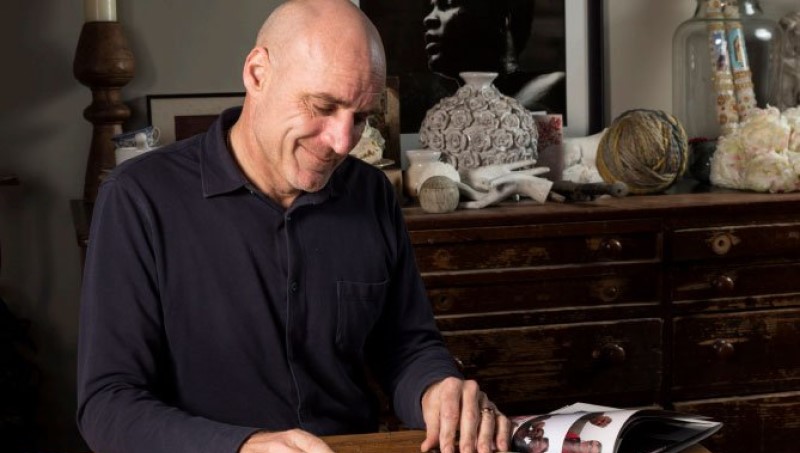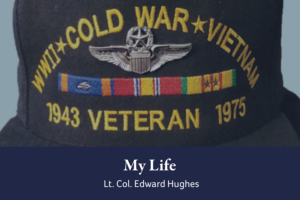Grant’s way of dealing with terminal cancer
Christopher Middleton meets a man with terminal cancer who is leaving the gift of his autobiography.
Grant Branton might have cancer, but he’s making the most of every last minute by creating a LifeBook, says Christopher Middleton (Reproduced courtesy of The Telegraph)
On the plus side, Grant Branton lives in a beautifully converted, open-plan house, and can see the Brighton seafront from his front door. The less good news is that he has terminal cancer and is not sure how long he has to live. However, instead of just sitting back and feeling sorry for himself, he has found his own special way of fighting back. He is writing his autobiography.
Not all on his own, though. He has hired a firm to send an interviewer, once a week for the next 10 weeks, to make tape recordings of his life story. After each session, his verbal recollections are turned into the written word, for him to amend and edit as he sees fit.
Once the chapters have been written and approved, he will be given not just a sheaf of typewritten pages, but five copies of a finished, printed book, with photographs of him as a small boy, right through to the 53-year-old he is today. Total cost £2,975.
By his own account, Grant was a bright, blond, slightly chubby young chap when a small boy. As a young man, he played every sport from squash to rugby to American football and ended up going into the film production business. Today, he is slimmer and less hairy. Also, he is determined to get the story of his life down on paper.
“Just two months before I learned that my cancer was now secondary and terminal, I had done a 100-mile bike ride,” he says. “The doctors gave me this news, and there was what you might call an awkward silence. I just felt dizzy.”
Once he had cleared his head, however, Grant set about making the most of the time left to him. It so happened that one of the firms he was working for was LifeBook, a company that specializes in helping people write their life stories.
He is now busy looking back through his own life, picking out the things that make him smile, that he wants to live on. One is the way his parents met: his mother was a ballet dancer, his father in the Merchant Navy. “The way they tell it, he arrived late, at a ballet performance, and because he had a seat in the front couple of rows, he disturbed everyone climbing into it.”
“Then I remember the time we were living in Asia, and there was an earthquake,” says Grant. “All the baboons were terrified, and ran out of the jungle onto the beach.”
“I got married in the Far East, too, in Thailand. Nine Buddhist monks were chanting at the ceremony, and I gave them each a bound copy of a different book: The Silver Sword, Stig of the Dump and others.”
“At the end of the ceremony, my wife Christine and I didn’t kiss, we shook hands. However, the next day when we went to register the marriage, we were arrested and fined because we had overstayed our visa. That was 20 years ago.”
Fortunately, they resolved the issue, and Christine is still by her husband’s side, keeping him supplied with plenty of hot drinks and moral support.
What does she think of his decision to write his life story? “I think it’s a beautiful thing to do,” she says. “The fact is, everyone has a story to tell, no one has had a completely normal life. And a lot of the time, your friends only know about the bit of your life that they’ve played a part in.”
That said, the hard part about writing your autobiography is picking out what to include. This is where Yvette Conn comes in. She’s the interviewer who will be recording Grant’s words. “We’ve talked a lot about those periods of Grant’s life on which he wants to concentrate,” she says. “The great thing about this project is that it is Grant who is in control.”
LifeBook Memoirs – Write Your Memoir
LifeBook was set up by Roy Moëd following his experience with his own father. “It began one day as I was leaving him in a home, towards the end of his life, when he was blind and couldn’t taste his food,” he recalls. “I was about to say to him, ‘Don’t worry, Dad, it will be better next week’, when I stopped myself and thought, ‘No it won’t, he will be a bit blinder and closer to death.”
“That’s why I created, that day, a project for him to live for, and sent a third party to interview him each week: Dad had a project he really enjoyed, and we had precious stories, many of which we had never heard, or had forgotten.”
Not that LifeBook authors need be near the end of their lives to embark on an autobiography. Many take on the project purely as something to give their children or relatives.
However, if this is indeed the last lap of the race, then Grant is making the most of it. “The thing is, I want to die on my own terms,” he says. “The only thing the doctors can offer me is chemotherapy, and I refuse to subject myself to that. As far as I can see, your body just collapses.”
“The only positive thing about my situation is that I realize how little time there is. Each morning, for a few moments, I wake up without illness, and then I remember I’ve got cancer. So often in life, you’re too busy coping with the here and now – getting the burst water pipe fixed, or something like that. Then suddenly you’re told you’ve not got long to live, and it’s all too late. The knowledge that you’re going to die soon makes you concentrate on the important things.”
“One part of me would love to go to Japan to see the cherry blossom season one more time, and I’m still hoping to see some more of Britain. The fact is, though, I realize the more important thing is people and my relationships with them. I know it’s not ideal, but at least this way I can leave something behind for the people who are important to me.”
Learn more about writing your memoir with LifeBook Memoirs.




